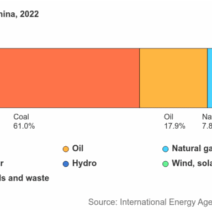Global warming, an existential threat, looms large over humanity’s collective future. In an era characterized by rapid technological advancement and unabated industrial growth, the question arises: are companies genuinely doing enough to combat this pervasive phenomenon? The alarming trajectory of climate indicators suggests otherwise, prompting scrutiny of corporate commitments and actions. This dissection will examine the complexities surrounding corporate responsibility in climate action, the enigmatic nature of ‘greenwashing,’ and the imperative for transformative practices in the private sector.
At the outset, it is crucial to delineate the current corporate landscape regarding sustainability initiatives. Many corporations, particularly those in fossil fuels, manufacturing, and transportation, are beginning to adopt sustainability as a core principle, incorporating environmental, social, and governance (ESG) criteria into their operational philosophies. However, superficial commitments, often replete with corporate jargon, do not necessarily equate to substantive action. While numerous companies have pledged to achieve net-zero emissions by a designated year, the details of these commitments can be nebulous at best.
The term ‘greenwashing’ has entered the lexicon as a descriptor for the disingenuous portrayal of environmental efforts. It is a tactic employed by companies to project an eco-friendly image without implementing significant environmental reforms. For instance, merely changing the logo to green or launching an eco-label product does little to reduce carbon footprints or enhance environmental stewardship. This practice not only undermines genuine sustainability efforts but also deceives consumers into thinking they are supporting environmentally responsible organizations. This duplicity raises pivotal questions: How are we to discern authentic commitment from mere marketing ploys?
Transitioning from traditional business models to ones that prioritize sustainability requires an encompassing examination of supply chains, resource use, and production processes. A salient concern is whether companies are fully embracing this necessity or simply glossing over critical aspects. For example, many firms tout their commitment to renewable energy sources, yet a significant portion of their energy needs may still be fulfilled through non-renewable resources. Moreover, the extraction processes for renewable materials, such as lithium and cobalt, often engender significant environmental degradation. Thus, it becomes evident that simply shifting to renewable energy is inadequate; a holistic approach encompassing responsible sourcing and production processes is paramount.
The corporate world is ostensibly cognizant of the impending repercussions of climate change, such as more extreme weather events, rising sea levels, and escalating operational costs. Yet, the disproportionate emphasis on short-term profits perpetuates a lack of substantive engagement with climate issues. Shareholder primacy remains a driving force, often eclipsing the imperatives of social responsibility. This myopic focus fosters a paradox: despite widespread acknowledgment of climate change, immediate financial returns routinely take precedence over long-term sustainable strategies. The failure to integrate an ecological mindset into the fabric of business strategy often leaves companies ill-equipped to adapt to future challenges.
Furthermore, regulatory frameworks in numerous jurisdictions inadequately incentivize or enforce corporate accountability regarding emissions reductions. Governments wield significant influence over corporate behavior through policy directives. However, the tenuous nature of environmental regulations often oscillates with political climates, resulting in inconsistent guidelines that fail to spur conclusive action. The lack of enforceable standards allows businesses to operate with minimal accountability, which may reinforce complacency among industry leaders.
While many corporations are making a concerted effort to pivot towards sustainability, numerous barriers detract from realizing more ambitious climate targets. Among these impediments, the complexity of climate science itself can be paralyzing. The interlinked facets of climate action necessitate a level of interdisciplinary collaboration rarely seen in corporate environments. Successful climate initiatives require decoupling economic growth from greenhouse gas emissions — a daunting task that demands innovative technological breakthroughs and ingrained behavioral changes.
Crucially, the role of consumer influence cannot be overstated. A discerning and environmentally conscious consumer base can exert considerable pressure on companies to adopt sustainable practices. Demand for transparency encourages organizations to evaluate and disclose their environmental impact. In recent years, corporate social responsibility reports have proliferated, yet they could benefit from increased specificity regarding measurable outcomes. Transparency cultivates trust, empowering consumers to make informed decisions that align with their values in support of true sustainability.
Moreover, corporate engagement with initiatives like the Science-Based Targets initiative (SBTi) can serve as a conduit for aligning efforts with scientifically validated climate goals. Companies that commit to science-based emissions targets are held to rigorous standards that demand accountability. While not a panacea, adherence to such initiatives represents a positive shift towards mitigating the deleterious effects of climate change.
In conclusion, the question of whether companies are truly doing enough to tackle global warming elicits a spectrum of responses, each revealing layers of complexity. The current state of corporate climate action must evolve beyond superficial measures to embed sustainability deeply into core strategies. Beyond rhetoric, actionable initiatives backed by transparency and accountability will bolster genuine environmental progress. Only through collective commitment from both corporations and consumers can the specter of global warming be addressed effectively, fostering a sustainable future for generations to come.








